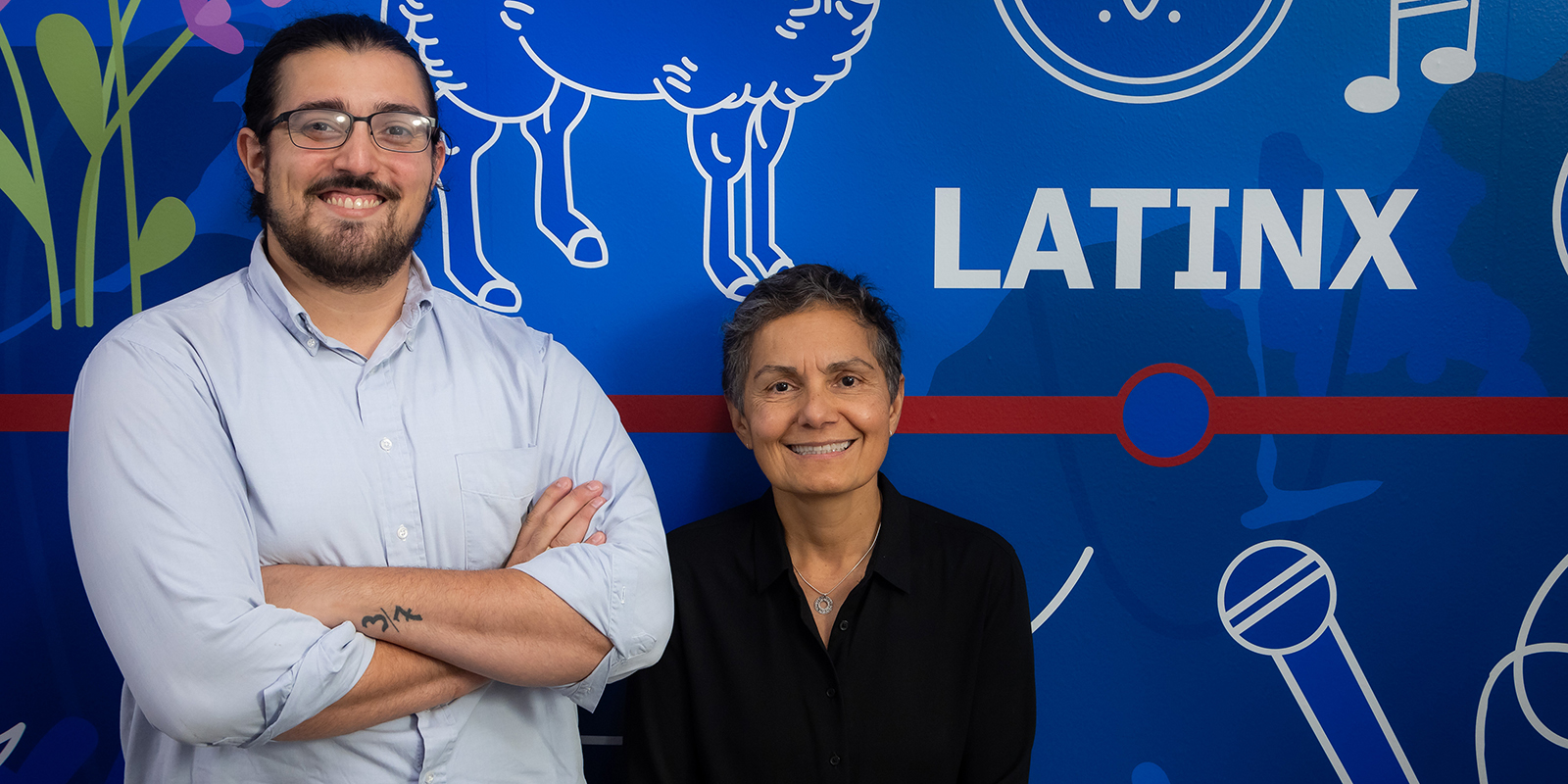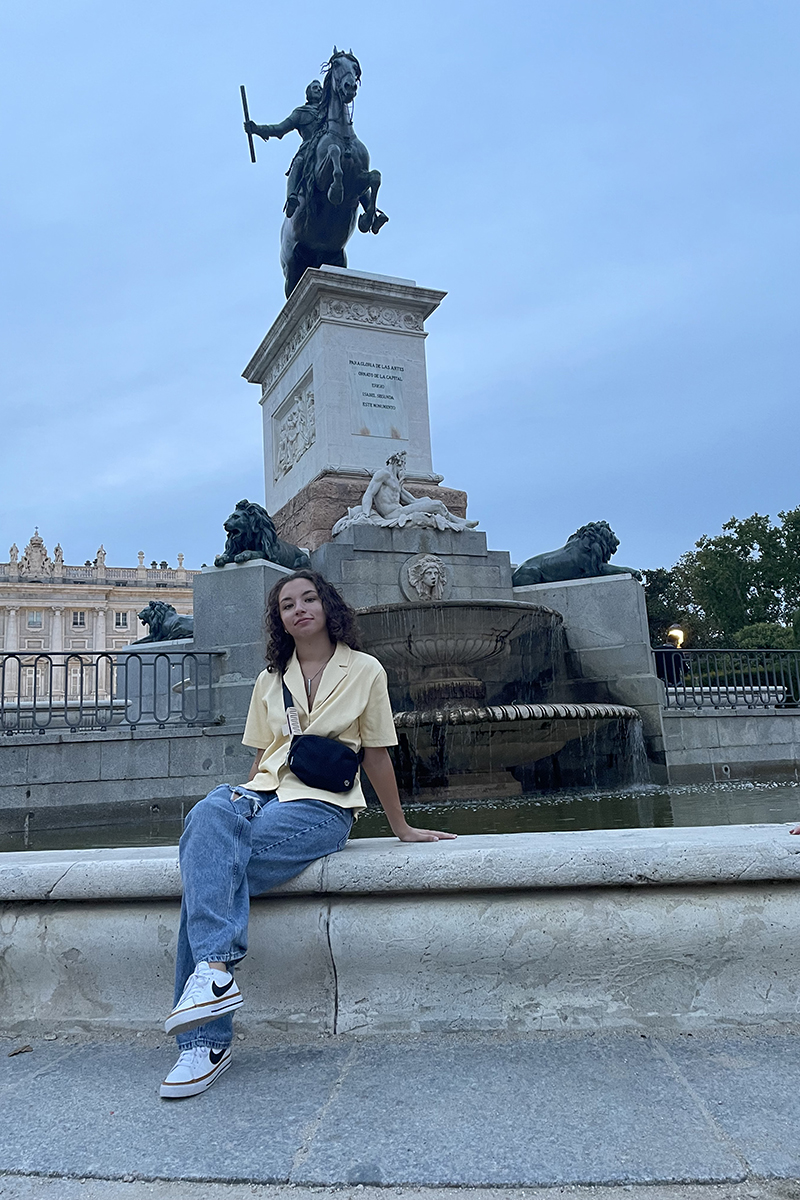
Lourdes Torres, a Society of St. Vincent de Paul Professor in Latino Studies, notes that by 2060, Latinos will make up nearly a third of the U.S. population. Torres and Vincent Peña, a journalism assistant professor in the College of Communication, lead the new Latino/a Culture and Communication program. (Photo by Jeff Carrion / DePaul University)Arriving to DePaul in fall 2021, Fiorella O’Connor was unsure what she
wanted to study. She signed up for courses in communication, media and
Latino Studies. Her favorite was “Growing Up Latino/a in the U.S.” with
Professor Lourdes Torres.
“I always wanted to study something that had to do with my people,” says
O’Connor, whose mother emigrated from Chile in the 1970s. “With my mom’s
experience, I’ve wanted to see how her story relates to history because
it’s all very parallel.”
The course set O’Connor on a path to be the first student to enroll in a
new degree — Bachelor of Arts in Latino/a Culture and Communication. The
interdisciplinary program prepares students for careers in journalism,
public relations, advertising, education and social services. Torres, a
Society of St. Vincent de Paul Professor in Latino Studies, notes that by
2060, Latinos will make up nearly a third of the U.S. population.
“Given the importance and demographics of Latinos in the U.S. today, the
exposure to Latin American and Latino cultures that this major offers is
going to be useful no matter what profession students pursue,” says Torres,
who leads the program with Vincent Peña, a journalism assistant professor
in the College of Communication.
 Fiorella O’Connor first student to enroll in a new degree — Bachelor of Arts in Latino/a Culture and Communication. She’s studying abroad in Madrid, Spain, this semester. (Courtesy of Fiorella O’Connor)
Fiorella O’Connor first student to enroll in a new degree — Bachelor of Arts in Latino/a Culture and Communication. She’s studying abroad in Madrid, Spain, this semester. (Courtesy of Fiorella O’Connor)Growing up Latino/a in the U.S. was a helpful introduction to the major.
O’Connor studied the historical origins of diverse Latino communities
across the country: when, how and why migrants from Mexico settled in
Chicago or those from the Dominican Republic flocked to New York City. Class
discussion focused on personal and community experiences of being a
first-generation American, which O’Connor identified with.
DePaul has seen its share of Hispanic undergraduate students grow from 17%
in 2012 to 23% in 2022. As part of
Designing DePaul
, the university has committed to becoming a Hispanic Serving Institution,
a federal designation that would fund support services for all students.
“Our program in Latino/a Culture and Communication is a wonderful example
of our commitment to build bridges between academic silos and help fulfill
our students’ purpose in life,” says Guillermo Vásquez de Velasco, dean of
the College of Liberal Arts and Social Sciences.
Media industry and beyond
Despite their growing numbers, Latinos are consistently underrepresented in
media industries, including news, movies, television, book publishing and
beyond, according to a
2019 report from the U.S. Government Accountability Office. DePaul’s
location in the third largest media market in the U.S. makes it an ideal
place for the program, Peña says.
“In a city with a large Latino population, there is a greater need to serve
these communities and this program will equip students to cover Chicago’s
Latino communities and understand their diverse cultures and histories,”
Peña says. “DePaul has partnerships with local Spanish-language news
outlets and organizations, and many professors are active industry
professionals. Students will get valuable, direct experience both inside and
outside of the classroom.”
The Latino/a Culture and Communication Program will offer internship,
research and volunteer opportunities with organizations throughout Chicago.
The degree will promote students’ cross-cultural understanding and
intercultural communication abilities, skills that are essential for careers
in professions in need of diversity.
O’Connor recently completed an internship with a logistics company. She
sees a career path in human resources that focuses on diversity, equity and
inclusion, and integrates what’s she’s learning at DePaul.
“My goal with a career in human resources is to provide opportunities for
people from marginalized groups who don't normally work in the field,” she
says.
More information on the
Latino/a Culture and Communication program
is on the College of Liberal Arts and Social Sciences website.